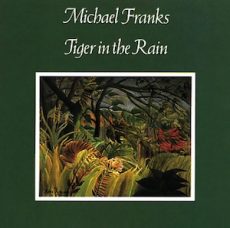
Daily Dose Of Jazz…
Michael Franks was born September 18, 1944 in La Jolla, California and grew up with two younger sisters. Neither parent was a musician but they loved swing music, and his early influences included Peggy Lee, Nat King Cole, George Gershwin, Irving Berlin, and Johnny Mercer. At age 14 he bought his first guitar, a Japanese Marco Polo for $29.95 with six private lessons included. Those lessons were the only music education that he received.
While at University High School in San Diego,California he discovered the poetry of Theodore Roethke with his off-rhymes and hidden meter. He began singing folk-rock, accompanying himself on guitar. Studying English at UCLA, Michael discovered Dave Brubeck, Patti Page, Stan Getz, João Gilberto, Antonio Carlos Jobim, and Miles Davis. Never studying music in college or later, he earned a Bachelor of Arts degree from UCLA in comparative literature in 1966 and a Master of Arts degree from the University of Oregon two years later. He returned to UCLA to teach after a stint in a PhD program in Montreal.
During this time Franks started writing songs, starting with the 1968 antiwar musical Anthems in E-flat and went on to compose music for films. Sonny Terry and Brownie McGhee recorded three of his songs, on their album Sonny & Brownie. Franks played guitar, banjo and mandolin on the album and joined them in touring. In 1973, he recorded an eponymous debut album, later reissued as Previously Unavailable.
In 1976 he released his second album The Art of Tea featuring the Crusaders and which saw Franks begin a long relationship with Warner Bros. Records. Subsequent albums came in 1977 and 1978 and through the 1980s. His move to New York City featured more of an East Coast sound on his albums and performance. Since then, Franks has recorded more than 15 albums.
He has recorded with a variety of well-known artists, such as Peggy Lee, Dan Hicks, Patti Austin, Art Garfunkel, Brenda Russell, Claus Ogerman, Joe Sample, and David Sanborn. His songs have been recorded by Shirley Bassey, Kurt Elling, Diana Krall, The Manhattan Transfer, Leo Sidran, Veronica Nunn, Carmen McRae, and Natalie Cole, aming other pop and rock artists.
Vocalist and songwriter Michael Franks, who plays guitar, banjo, mandolin, and cabasa, is still active and working on a new project.
More Posts: banjo,cabasa,guitar,history,instrumental,jazz,mandolin,music,songwriter,vocal
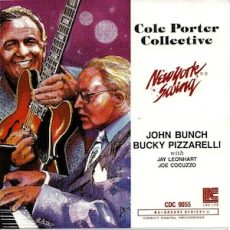
Daily Dose Of Jazz…
Joseph G. Cocuzzo was born on September 17, 1937 in Boston, Massachusetts and raised in a family of enthusiastic amateur musicians. He began playing drums as a small child, later studied extensively, and played in many bands in and around his home town.
In the late 1950s he was residing in Chicago, Illinois where he joined the big band led by Ralph Marterie before moving on to the Woody Herman band. By the early Sixties he worked with Don Ellis, Les and Larry Elgart, Gary McFarland and Tony Bennett. The mid-70s saw Joe returning to Bennett for a five-year engagement, then he was with Harry James before beginning a decade-long spell with Rosemary Clooney.
The subtle skills he displayed with Bennett and Clooney found him in demand as a singer’s accompanist and he also worked with Vic Damone, Julius LaRosa, Susannah McCorkle and Sylvia Syms. Throughout this period and on through the new millennium, Cocuzzo was in frequent demand for recording sessions, appearing on albums by many artists including Buddy De Franco and Dick Sudhalter.
During his time with Clooney Cocuzzo had begun writing song lyrics, and he went on to collaborate with several composers, notably the Brazilian Ivan Lins. A smooth and swinging player, always aware of the subtly supportive role required by many leaders, especially singers, Cocuzzo was a member of New York Swing.
Drummer and songwriter Joe Cocuzzo, who never recorded as a leader but has 77 recordings as a sideman, died on July 31, 2008 in New Jersey.
<!– wp:paragraph —More Posts: drums,history,instrumental,jazz,music,songwriter
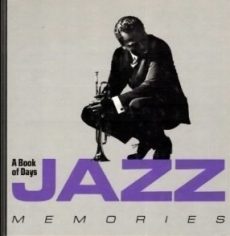
On The Bookshelf
JAZZ MEMORIES: A Book of Days | Michael Elhers
This book has been designed by Stephen Kruse in the date book format, with blank spaces to record appointments, notes, ideas, etc. or just to enjoy the facts about each artist featured on selected birthdays, festival openings, and other events on both sides of the pond in jazz history. The names are recognizable to adicionados, enthusiasts and for any first year student of jazz who has delved into the history of the genre.
The introduction gives hor and praise to not only the musicians but to everyone connected to the making of this project. This includes radio stations, critics, columnists, poets and writers. All text and notes have been written by Michael Ehlers.
The photographs of the musicians that fill this book are memories taken by Jerry Stoll, unless otherwise noted. His sensitive portraits capture not just the images of the musicians but also the spirit of their music.
The book is dedicated to Tommy Flanagan, a pianist’s pianist, and to the memory of John Henry Hammond (1910~1987), a jazz saint.
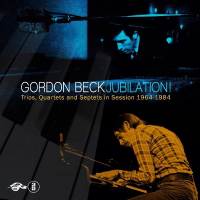
Daily Dose Of Jazz…
Gordon James Beck was born on September 16, 1935 in Brixton, London, England where he attended Pinner County Grammar School. He studied piano in his youth, but decided to pursue a career as an engineering technical draughtsman and moved to Canada in 1957 for this reason.
Largely self-taught, he returned to music after returning home from Canada in 1958, where he had been exposed to the works of George Shearing and Dave Brubeck. He became a professional musician in 1960 and played with saxophonist Don Byas in Monte Carlo. Beck joined the Tubby Hayes group in 1962, then led his own bands from 1965, including Gyroscope, from 1968, a trio with bassist Jeff Clyne and drummer Tony Oxley.
1967 saw the Gordon Beck Quartet record the album Experiments with Pops released on Major Minor MMLP 21 in 1968. That same year they recorded with Joy Marshall and released as When Sunny Gets Blue decades later.
Beck first played with vocalist Helen Merrill in 1969 and continued the relationship into the 1990s when she toured Europe. From 1969 to 1972 he toured with saxophonist Phil Woods’s European Rhythm Machine.
In the Sixties and Seventies he was a house pianist at Ronnie Scott’s Jazz Club. Beck played experimental funk with George Gruntz from1973-75), and free jazz with improv drummer John Stevens and was a member of Nucleus between 1973 and 1974.
From middle age, Beck played predominantly in mainland Europe, recorded albums with Allan Holdsworth, Henri Texier, Didier Lockwood and others. He often played solo from the 1980s and started teaching music at the same poin and toured Japan with Holdsworth in 1985.
Pianist Gordon Beck stopped performing around 2005 because of poor health and died in Ely, Cambridgeshire, England on November 6, 2011.
More Posts: bandleader,history,instrumental,jazz,music,piano
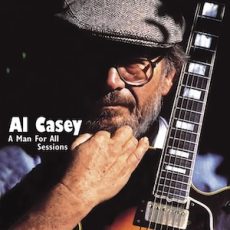
Daily Dose Of Jazz…
Albert Aloysius Casey was born September 15, 1915 in Louisville, Kentucky. He was a child prodigy who first played violin, then switched to ukulele. He began playing guitar in 1930 and attended DeWitt Clinton High School in New York City where he studied guitar. He met Fats Waller in 1933 and the following year, at eighteen, he became a member of Waller’s band.
Making several recordings with the band, he is known for having played the solo in Buck Jumpin’. After Waller’s death in 1943, he led his own trio and for two consecutive years in the 1940s, he was voted best guitarist in Esquire magazine.
From 1957, he was a member of a rhythm and blues band led by King Curtis. Four years later he dropped out of music, though he returned in the 1970s to record with Helen Humes and Jay McShann. Another absence followed until 1981, when he returned to music to play with the Harlem Blues and Jazz Band.
During his career, Casey worked with Louis Armstrong, Chu Berry, Coleman Hawkins, Lionel Hampton, Billie Holiday, Billy Kyle, Frankie Newton, Clarence Profit, Art Tatum, and Teddy Wilson.
Guitarist Albert Casey died of colon cancer on September 11, 2005, four days shy of his 80th birthday.
More Posts: bandleader,guitar,history,instrumental,jazz,music



